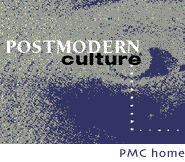
-
Dear Readers,
With our January, 1997 issue, Postmodern Culture begins publishing with the Johns Hopkins University Press. Hopkins' innovative Muse project promises to advance the art of electronic publishing in ways that will benefit the journal and its readers. Johns Hopkins Press will also provide much needed financial and technical support. This new arrangement entails some changes in our operation, but we'll continue to bring you innovative and challenging interdisciplinary work and hope you'll continue with us in this intellectual and publishing adventure.
Postmodern Culture will continue to be published three times each academic year: September, January, and May. As each new issue of the journal becomes available it will appear simultaneously at the journal's current World Wide Web address (WWW.IATH.VIRGINIA.EDU/PMC) and on JHUP's Project Muse online journals site (MUSE.JHU.EDU). The Virginia site will offer the current issue in World Wide Web format (HTML) free of charge. When a new issue is published it will replace the prior issue. A text-only archive of back issues is also available free of charge.
The Hopkins site will provide SGML-encoded text, searchable access to all issues and volumes of the journal, and other enhancements including document delivery by special order. Access to this site and its services is by paid subscription. Readers affiliated with institutions that subscribe to the Muse project will have access through those subscriptions. To find out if your institution subscribes, see our subscriber list. Institutions may obtain PMC either through a full-resource subscription to Project Muse or through a single-title subscription at the rate of $50 per year. Individuals not affiliated with subscribing institutions may subscribe for $20 per year.
JHUP will notify individual subscribers of the contents of each issue as soon as it is published. Later in the year subscribers will be offered an article notification service that will record a user profile reflecting particular interests in subjects or authors.
The PMC LISTSERV list will continue at Johns Hopkins. JHUP will distribute the table of contents for each issue through this list; however, because conversion from HTML/SGML to ASCII is prohibitively complex and expensive, we will no longer provide text-only versions of articles.
The change from free electronic distribution to a combination of free and for-fee access may surprise some of our readers, so it deserves an explanation. Since the founding of the journal, the University of Virginia and North Carolina State University have generously subsidized PMC's operations, but they cannot continue this support. Grants for startup funding have gradually been exhausted. In order to carry on, the journal needs a source of income.
PMC has been and continues to be the work of many volunteers. The editors and editorial board contribute their time and efforts without remuneration. Nonetheless, the journal incurs numerous costs, including a paid staff (our hard-working managing editor and various assistants), postage, telephone bills, advertising, software, supplies, etc. We have to recover some of these operating expenses.
Gaining financial solvency is one reason we've affiliated with the Johns Hopkins University Press, a publisher that is in the forefront when it comes to providing inexpensive, broad access to electronic scholarly materials. Project Muse, JHUP's innovative electronic journals collection, enables worldwide, networked access via subscription to the full text of over forty journals. Muse currently enables access by over 2.3 million academics at more than 260 subscribing institutions, as well as to the 4 million residents of Cleveland and Pittsburgh through their public library systems.
We're very pleased that Johns Hopkins has agreed to work with us to meet the challenges of publishing a contemporary academic journal. With this new situation PMC finds a stable home and secures its future; we think that this arrangement offers as much as possible both to casual and professional readers at minimum cost. Academic publishers will have to find new paradigms that serve their audience in the evolving electronic environment. That is what we have endeavored to do ourselves, and will continue to do as part of Project Muse.
If you are affiliated with an academic institution, please encourage the library to subscribe to the Muse collection and/or to PMC.
Thank you.
LISA BRAWLEY
STUART MOULTHROP
JOHN UNSWORTH
Editors, Postmodern Culture
